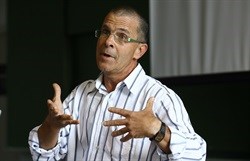
Being a teacher in the 21st century is tough: difficult pupils; hunger, poor nutrition and ill health in communities; over-sexualised or violent behaviour in the home; parents without education; HIV/Aids and child-headed households - before we even start talking about wages, housing subsidies and the conditions under which we expect teachers to do their jobs. ICT is a challenge. One has immense sympathy for teachers. All over the world, teacher strikes happen.
Teachers' pay is poor. When middle-class teachers can barely afford a car or the deposit for a house, when promises of improvements vanish as junior officials intensify paperwork rather than support, we are far from a conducive environment for learning.
Resolutions taken at the teacher summit a while back for increased coordination between training institutions/universities and the teaching profession are taking painfully long to become a reality. Universities must up their game if they are to resist pressure to open teacher colleges that gave us the teachers we have today.
Urgent district improvements and teacher support are not yet reflected in actions or provincial budgets.
Education outcomes in South Africa are almost the worst in the world.
One can understand why so many teachers are demoralised and want to leave the profession, despite increased numbers entering. Funza Lushaka bursaries and efforts of organisations such as Teach SA to attract fresh talent are only the tip of the iceberg.
Teachers and their unions fall too easily into victim mode. We hear teacher regions on public radio wash their hands of deep-rural kids saying "nothing can be done" because of unfair inequalities and the real legacies of colonialism. Some teachers are panting for so-called militant action. Threats are issued against pupils and to burn the cars of non-strikers or to make specific people heads of schools. Yet blaming teachers and simple actions, as in the Northern Cape, don't help either.
The behaviour of a small group of thugs rests on intimidating and instilling fear among principals or fellow teachers. Until good teachers find their voices or pupils and parents see off these thugs, the public face of teachers will not win endless sympathy. Many teachers arrive on Saturday mornings to teach or put their hands in their pockets to feed hungry kids.
Yet there are too many cases in "normal times" of principals threatened or manoeuvers to ensure that union officials or pals get jobs. There is too much direct politicking in education and too little leadership and participation by the poor.
This current situation is the only one we have; these pupils and communities are where we are today. We cannot wish for perfect conditions before we decide to change our lives.
We must start with our realities and work with the situation as it is. While there is much wrong to fix, if we never rise above our circumstances we will never learn to fly. This doesn't call for miracles or a single solution. The only magic is at the coalface of learning where teacher meets pupil and the intellectual assets of our nation are nurtured to grow.
Any teachers' strike threatens results and outcomes, adds instability and deepens mistrust between departments and teachers, pupils and principals. The support of parents and the community could well vanish for years to come.
We need to improve pay and the working conditions of our teachers for education to be the national priority we all want it to be.
At the same time, the public should assure teachers of their support and the strong desire for improved schooling outcomes. This requires the involvement of the public, parents, school governing bodies, learners, the government and its officials as well as teachers and their unions. Improvements will take more than a day.
During Teachers' Month, October, let us be reminded that the ultimate key to improving education is the teachers and what they are able to do.
Teachers are at the heart of South Africa's future and should be saluted: the fate of the country's children lies squarely in their hands. The frontline of liberation is in our schools and much lies with teachers.
For World Teachers' Day in South Africa the National Education Collaboration Trust is coordinating an event supported by the Department of Basic Education, South African Council of Educators, the Education Labour Relations Council, Teacher Unions, Higher Education and Big Business to raise awareness of the value of teachers and teaching in our society, under the banner "Our Teachers, Our Future".
